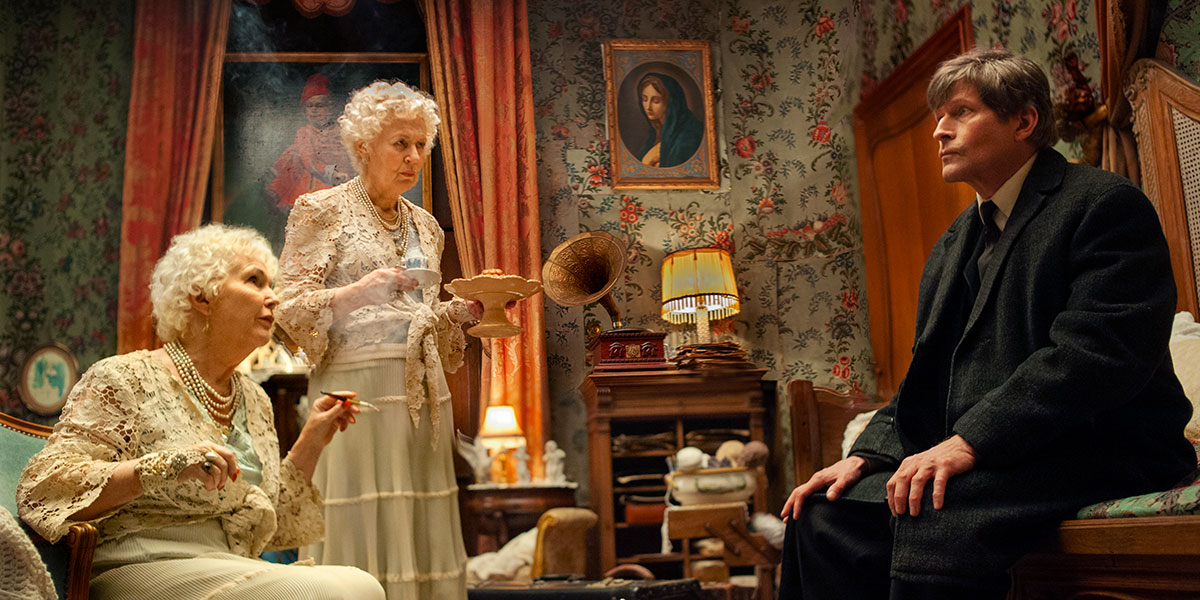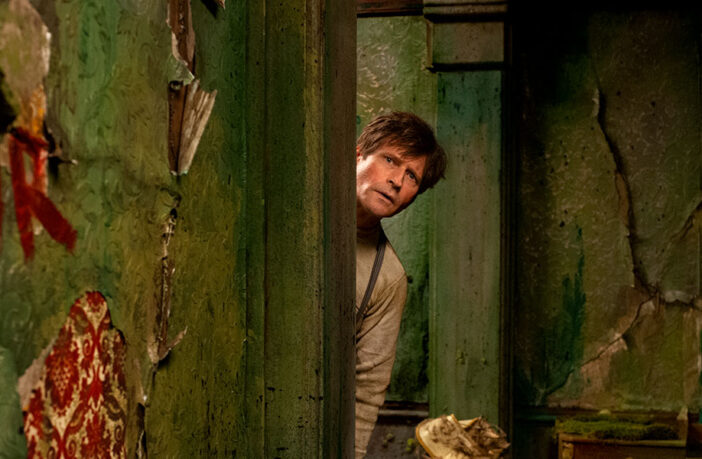“Every human being is a universe within themselves…floating about in eternal darkness—aimless, lonely,” a man reflects with melancholy through a voiceover. At the same time, we see the same man onstage in a club as he pulls off a magic trick in front of an uninterested crowd. As we focus on his dejected reaction to the indifference, the voiceover continues, “…or maybe it’s just me.”
With “Mr. K,” Writer/Director Tallulah H. Schwab channels Franz Kafka in ways so deliberate, we already know why the titular character has that name. Nonetheless, the inspiration pays dividends in this surrealist comedy-drama, as the film allowed Crispin Glover to really sell his eccentric and awkward wares on the screen. And with a story so nightmarish, claustrophobic, and darkly comic, it’s weird to say that the same awkwardness becomes the straight character in this trippy journey.
More TIFF Coverage: ‘Can I Get a Witness’: Skilled World Building and Visuals Elevate Ann Marie Flemings Sci-Fi Offering
‘Mr. K’ Goes to Kafka’s Idea of a Horror Hotel
After a dismal performance in a bar, struggling magician Mr. K (Glover) checks in at a nearby hotel, ostensibly to perform at a nearby place the next day. Asking the innkeeper about directions so he could leave first thing in the morning, Mr. K instead gets a spiel of the hotel rules and regulations. The rules, ranging from basic guidelines about noise to tenant-centric reminders about decorating, seem a little off; especially given that he only intends to stay for one night.
Things go south in no time when Mr. K discovers an old man and young maid hiding under his bed and in his closet, respectively. This, along with a bad dream he had while sleeping, compels Mr. K to simply check out of the hotel. The problem, no surprises here, is that he can’t find his way out. The remote hotel—with a look that evokes the eventual run-down condition of the Grand Budapest but with a feel that summons the threateningly pristine condition of the Overlook Hotel—is a maze, with Mr. K being unable to trace his steps back down to the lobby.
Schwab and the filmmakers unleash a barrage of strange characters, making Mr. K question his own sanity. These include a stampede of a playing marching band all exiting from a small trapdoor to the corridor; kids who steal one of his briefcases; waiters carrying trays with food; and an eccentric artist (Sunnyi Melles) who tells Mr. K that “the little, unimportant things, those are the most essential.”
More TIFF Coverage: ‘Paying for It’ Infuses Humor and Reason in Destigmatizing Transactional Sex

“Are you afraid of death?”
All these, however, get their jumpstart from two elderly lady guests (Fionnula Flanagan and Dearbhla Molloy) who ask him the question above. Their unease, however, catches Mr. K’s attention, making him believe that there is something sinister happening within the hotel. True enough, he experiences these firsthand: the hotel shrinks by the day, people enter rooms that lead to nowhere, and characters engage in conversations that imply a no-escape scenario for everyone involved.
Apart from those weird instances, Mr. K constantly hears the banging on the hotel halls that the others simply ignore; and sees several vandalized corridors with the word ‘LIBERATOR’ in shouty, bloody capitals. At one point, he even has a close encounter with several hands attempting to drag him to a dark void upon asking him if he’s their liberator.
“Mr. K,” while using a Kafkaesque narrative device to tell its narrative, is in many ways a simple story. Suddenly, the protagonist becomes an unwilling hero to other people’s story. For him, this is ironic, since he doesn’t even feel like he’s one to his own. And once the film unravels in its third act, we finally understand the second part of the two elderly ladies’ question above:
“You mustn’t confuse death with dying.”
A Homage Done Well, Even If the Story Doesn’t Quite Stack Up
The crew working alongside Schwab did a remarkable job here, with Frank Griebe’s camerawork capturing the director’s Lynchian vision of claustrophobia. Even more so, the production designers of this film also deserve praise, with Maarten Piersma and Manolito Glas bringing to life a Lynchian concept of claustrophobia populated by hapless characters out of Kafka’s mad genius.
Finally Schwab’s choice of Crispin Glover in the lead role is perfect casting, given the actor’s penchant for eccentric and enigmatic performances. And while the execution of the story sometimes wobbles (pacing being the main culprit here), it allows Glover to shine. This is arguably his best performance in ages, and it couldn’t have come at a better time and—for better or worse—with a more appropriate film befitting his caliber.
With “Mr. K,” Tallulah H. Schwab manages to pay proper homage to Kafka’s themes of alienation and bureaucratic absurdity, at the same time borrowing from masters of the past like Stanley Kubrick (“The Shining”) and even Marc Caro and Jean-Pierre Jeune (“The City of Lost Children”). And by casting Crispin Glover in a role that he’s born to play, who am I to complain?

